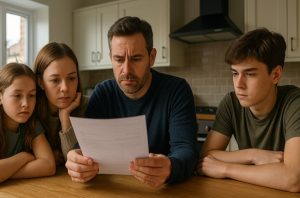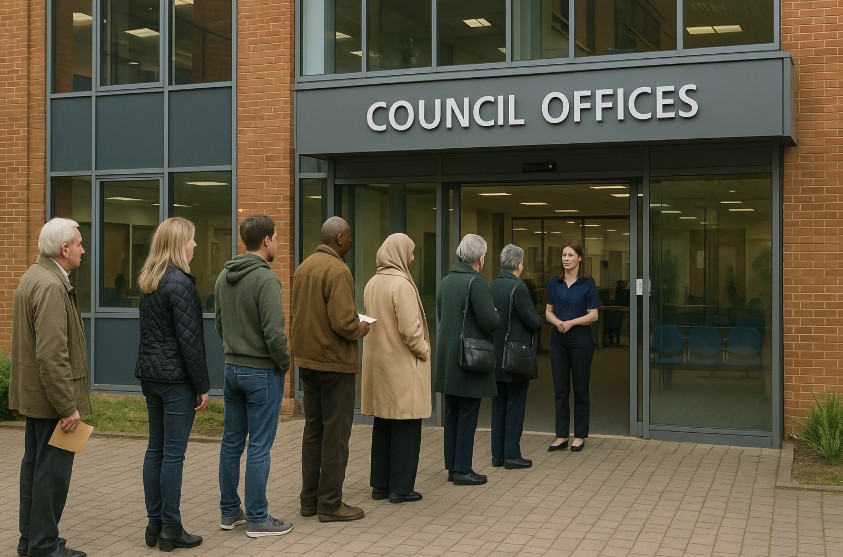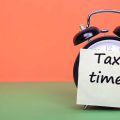Last Updated on: 19th August 2025, 07:18 am
Have you ever wondered how long someone can stay in a property without paying Council Tax? It is a common question for homeowners, tenants, and even those who have occasional guests. Council Tax is one of the most important household bills in the UK, and failure to deal with it properly can lead to unexpected debts or penalties.
Understanding the rules helps you avoid costly mistakes and gives clarity on what counts as liability. From short-term visitors to long-term tenants, every case can look different.
This guide will break down exactly how Council Tax works, who needs to pay it, and what happens if payments are missed. We will also cover how long councils can chase unpaid bills and what exemptions or discounts might apply. By the end, you will know your rights, responsibilities, and the limits of non-payment.
What Is Council Tax and Who Has to Pay It?

Council Tax is a local tax charged on residential properties to help fund public services such as rubbish collection, street lighting, and road maintenance.
Every local authority in England, Scotland, and Wales manages this system separately, but the rules remain largely similar across the UK. Most adults over 18 living in a property are usually liable to pay.
The amount depends on three key factors:
- The valuation band of the property assigned by the Valuation Office Agency
- The local council’s annual funding requirements
- The number of eligible adults living in the home
Council Tax bills are normally calculated on the basis of two adults sharing a property. If only one adult is liable, you may qualify for a 25 percent discount.
Certain groups such as full-time students, apprentices, and people under 18, are not counted for liability purposes. In those cases, the other adults may qualify for a discount or, in rare cases, a full exemption. Council Tax ensures local services continue running, so the responsibility is seen as a priority by local councils.
How Does Council Tax Work in the UK?
When you move into a property, the council will issue a bill covering the financial year starting each April. Payments are usually split into ten instalments, leaving February and March free of charges, though some councils offer 12-month plans.
The property you live in is placed in a valuation band from A to H in England and Scotland or A to I in Wales. These bands reflect the property’s estimated market value at a set point in time. The higher the band, the more you are expected to pay.
Council Tax is flexible in terms of payment methods. You can pay monthly by direct debit, bank transfer or even in a lump sum if preferred. If you move house, it is vital to inform both your old and new local authorities promptly.
This prevents paying for the wrong property or being chased for bills you are not liable for. The system can seem complicated at first, but councils provide support to make sure households understand their obligations.
How Long Can Someone Stay Without Paying Council Tax?

It is not unusual for people to ask how long a guest or family member can stay without becoming liable for Council Tax. The answer depends on their situation and whether they are already paying elsewhere.
Guests vs Tenants
Short-term visitors who already pay Council Tax at another address are not required to contribute to your bill. For instance, if a friend spends a few nights at your property while keeping their own rented accommodation, they remain liable at their primary residence. Tenants, however, are considered residents and will normally share responsibility for payments.
Short-term vs Long-term Stays
Temporary stays, such as a relative visiting for a week, do not usually affect your bill. Problems occur when a guest remains for an extended period.
Councils may reassess your situation if another adult effectively becomes a permanent resident. If you had a single-person discount, it will no longer apply once someone else lives with you on a permanent basis.
When a Discount is Lost?
The most common impact of a long-term stay is the loss of the 25 percent single-person discount. This must be reported to your local council as soon as possible. Failure to declare a change can result in backdated charges or even a fine of up to £1,000.
Councils expect transparency, so it is always safer to inform them quickly when living arrangements change. In short, someone can stay without paying Council Tax for a short while, but long-term residents trigger liability.
What Happens If You Stop Paying Council Tax?
Missing a Council Tax payment can quickly lead to serious consequences. Councils treat it as a priority debt because it funds essential community services.
If you miss one payment, you will typically receive a reminder notice giving you seven days to catch up. Failure to comply can result in the loss of your right to instalments and the full annual amount becoming due immediately.
Councils only issue two reminders within one financial year, after which a final notice may be served. Legal action is common when payments remain outstanding.
Councils can apply for a liability order from the court, giving them power to:
- Deduct money directly from your wages or benefits
- Instruct enforcement agents or bailiffs to recover the debt
- Add legal costs to your balance
Because Council Tax arrears escalate quickly, it is strongly advised to address problems as soon as they arise.
Can You Get a Council Tax Discount or Exemption?

There are ways to reduce or even avoid Council Tax if you meet the criteria. Discounts are available when fewer adults are counted as liable in the household. The most common is the single-person discount of 25 percent, which applies if you are the only adult living there.
Other discounts include reductions for households with apprentices, carers, or people on low incomes through Council Tax Support. In some cases, people with disabilities may qualify for a reduction if their property has been adapted.
Exemptions apply when a property is entirely occupied by individuals who are not liable. This includes full-time students, people under 18, or those with severe mental impairment.
Certain empty properties may also be exempt, such as homes undergoing major structural repair. Each local authority sets rules, but the principles are consistent. Checking eligibility can save a significant amount and prevent overpayment.
How Long Can Councils Chase You for Council Tax Arrears?
Council Tax arrears do not disappear easily. Under the Limitation Act 1980, councils can pursue unpaid debts for up to six years. However, unlike some unsecured debts, councils are unlikely to let arrears lapse.
Most councils act promptly, applying to the courts for a liability order soon after repeated missed payments. Once granted, this order allows them to recover money using stronger enforcement measures.
This means you may face wage deductions, benefit deductions, or visits from bailiffs well before six years pass.
In practice, councils rarely wait the full limitation period. Their approach is to take quick and direct action to secure repayment.
For this reason, it is best to engage with your local authority if you are struggling. Ignoring arrears only increases costs and stress. Being proactive can often result in an affordable repayment plan instead of enforcement.
Do Lodgers, Guests or Family Members Need to Pay?

Whether someone staying in your property needs to pay Council Tax depends on their circumstances. If your partner regularly visits but continues to pay Council Tax elsewhere, your discount is not affected. However, if they move in permanently and no longer pay at another property, they may become liable.
Adult children returning from university remain exempt as students, but if they finish studying and begin earning, they will be counted as an additional adult. This could remove any single-person discount you previously held.
Lodgers can be liable depending on the tenancy agreement. In some cases, the homeowner retains responsibility, while in others the lodger shares liability.
Guests staying for short visits are never liable, but it is important to be clear about the line between visitor and resident. Councils assess the situation based on the duration of stay and financial arrangements in the household.
What Should You Do If You Can’t Afford Council Tax?
If you are unable to pay Council Tax, it is important to act quickly rather than ignore the problem. Councils are usually willing to discuss repayment plans if you explain your circumstances.
The first step is to contact your council’s revenue department and request an affordable instalment plan. You may also be eligible for Council Tax Support if you are on a low income or receiving benefits. This can reduce the amount owed significantly.
Other options include applying for discounts such as single-person reduction, disability band reduction, or the second adult rebate. Independent debt advice charities can also guide you through the process and help negotiate with the council.
Ignoring the issue will only lead to enforcement action and additional costs. By engaging early, you can usually avoid court involvement and find a realistic solution that keeps your household finances manageable.
Conclusion
Understanding how long someone can stay without paying Council Tax is essential to avoid unexpected financial consequences. Short-term visitors rarely affect your liability, but long-term stays can remove valuable discounts.
Councils treat non-payment seriously and act quickly to recover arrears, often through courts and enforcement measures. At the same time, there are genuine ways to reduce or even eliminate Council Tax bills if you qualify for exemptions or discounts.
If you find yourself struggling, reaching out to your council is always better than ignoring the issue. By staying informed, transparent, and proactive, you can protect your household from unnecessary stress and manage your responsibilities with confidence.
FAQs
Do guests need to pay Council Tax?
No, short-term guests do not pay Council Tax if they already pay elsewhere.
Can councils fine you for not reporting a new resident?
Yes, failure to report a permanent resident can lead to a fine of up to £1,000.
How soon do councils take action for missed payments?
Most councils act after one missed payment by issuing a reminder within days.
Can students be fully exempt from Council Tax?
Yes, full-time students are disregarded and usually exempt from Council Tax.
What happens if my child returns from university?
If they remain a student, no Council Tax applies. If working, they count as an adult.
Can Council Tax debt be written off after six years?
In theory, yes, but councils rarely allow arrears to expire without legal action.
Can I negotiate lower payments with my council?
Yes, councils often agree to repayment plans if you cannot afford the full amount.




















No Comments
Leave a comment Cancel